1061 scholarly books by Catholic University of America Press and 106
1061 scholarly books by Catholic University of America Press
106 have author last names that start with S have author last names that start with S
106 have author last names that start with S have author last names that start with S
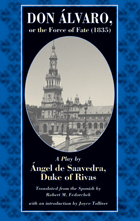
Don Álvaro, or, The Force of Fate
Ángel de Saavedra
Catholic University of America Press, 2005
In this English edition designed for either classroom use or performance, Robert Fedorchek presents a readable translation faithful to the tone and spirit of the original.
[more]
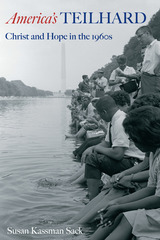
America's Teilhard
Susan Kassman Sack
Catholic University of America Press, 2019
America’s Teilhard: Christ and Hope in the 1960s is a study of the reception of Teilhard in the United States during this period and contributes to an awareness of the thought of this important figure and the impact of his work. Additionally, it further develops an understanding of U.S. Catholicism in all its dimensions during these years, and provides clues as to how it has unfolded over the past several decades. Susan Sack argues that the manner and intensity of the reception of Teilhard’s thought happened as it did at this point in history because of the confluence of the then developing social milieu, the disintegration of the immigrant Catholic subculture, and the opening of the church to the world through Vatican II. Additionally, as these social and historical events unfolded within U.S. culture during these years, the way Teilhard was read, and the contributions which his thought provided changed. This book considers his work as a carrier at times for an almost Americanist emphasis upon progress, energy and hope; in other years his teleological understanding of the value of suffering moves to center. Additionally, the stories of numerous persons – scientists, theologians, politicians, and scholars – who became involved in the American Teilhardian effort are detailed.
[more]
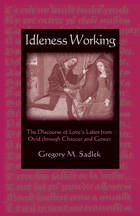
Idleness Working
the Discourse of Love's Labor from Ovid through Chaucer and Gower
Gregory M. Sadlek
Catholic University of America Press, 2004
Inspired by the critical theories of M. M. Bakhtin, Idleness Working is a groundbreaking study of key works in the Western literature of love from Classical Rome to the late Middle Ages.
[more]
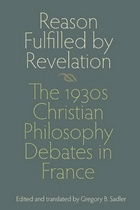
Reason Fulfilled by Revelation
The 1930s Christian Philosophy Debates in France
Gregory B. Sadler
Catholic University of America Press, 2011
This selection of previously untranslated documents from the French debates about Christian philosophy provides a long-needed complement to available English-language literature on the subject.
[more]
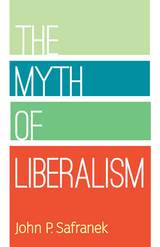
The Myth of Liberalism
John P. Safranek
Catholic University of America Press, 2015
Individual freedom looms large in political and ethical thought. Nevertheless, the theoretical foundations underlying modern liberalism continue to be contested by proponents and opponents alike. The Myth of Liberalism offers a unique contribution to this debate by following through on the often-underdeveloped suggestion that liberal principles are untenable because they are self-contradictory. By analyzing and ultimately refuting each of the proposed underpinnings of liberalism - liberty, equality, rights, privacy, autonomy, or dignity - Safranek concludes that contemporary liberalism is a myth: it is not a coherent political philosophy as much as a collection of causes masked by emotively potent political rhetoric.
[more]
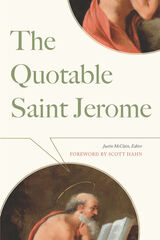
The Quotable Saint Jerome
Jerome Saint Jerome
Catholic University of America Press, 2020
Among the illustrious writers of the early Church, Saint Jerome (345-420) had a way with words few could equal. To honor the 1600th anniversary of the death of this patron saint of librarians and Scripture scholars, the Catholic University of America Press is releasing The Quotable Jerome, a well-organized collection of memorable wisdom from this early witness to Catholic truth.
While Jerome is known for acerbic wits, editor Justin McClain shows that much of the time, Jerome's writings are instructive and even inspiring. Homilists will easily be able to find what Jerome said on any number of topics--Scripture, the Trinity, the sacraments, persecution, heresy, divine revelation, or chastity--just to name a few. All citations are clearly sourced if the reader wants to pursue the longer passage in question.
“I am upset because I am human; I control my tongue because I am a Christian. Anger surges up in my heart, but I do not give vent to it.” - Homilies on the Psalms, Homily 10, Psalm 76 (77) (FOTC 48)
“The doer of evil has, indeed, killed his own soul; but the heretic—the liar—has killed as many souls as he has seduced.” - Homilies on the Psalms, Homily 2, Psalm 5 (FOTC 48)
“The Church does not consist in walls, but in the truths of her teachings. The Church is there where there is true faith.” - Homilies on the Psalms, Homily 46, Psalm 133 (134)
“To err is human, but to lay snares is diabolical.” - Dogmatic and Polemical Works, The Apology Against the Books of Rufinus, Book Three, paragraph 33 (FOTC 53)
“So much for what Scripture says; learn now what it means.” - Homilies on the Psalms, Homily 15, Psalm 82 (83) (FOTC 48)
[more]
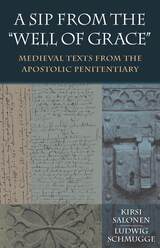
A Sip from the "Well of Grace"
Medieval Texts from the Apostolic Penitentiary
Kirsi Salonen
Catholic University of America Press, 2009
The first book to include full texts and photographs from the Apostolic Penitentiary, A Sip from the "Well of Grace" is groundbreaking in its analysis of one of the most important papal offices of the Middle Ages.
[more]
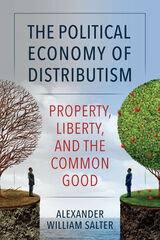
The Political Economy of Distributism
Property, Liberty, and the Common Good
Alexander William Salter
Catholic University of America Press, 2023
In recent years, prominent scholars, public intellectuals, and politicians have advocated reforming America’s economic model to embrace “common-good capitalism.” Catholic social teaching is a major influence on this movement. Is common-good capitalism compatible with the historical American commitments to private property rights and ordered liberty? What resources from Catholic social teaching can help orient free enterprise towards the common good? This book is the first scholarly inquiry into these exciting new questions.
We can better understand common-good capitalism by exploring the political economy of distributism. Formulated in the early 20th century by prominent Catholic intellectuals such as Hilaire Belloc and G.K. Chesterton, distributism emphasizes the importance of widely dispersed property ownership for human flourishing. Distributist thinkers, opposed both to capitalism and socialism, sought a humane approach to politics and economics that reflected the truths of Catholic social teaching.
Some of the distributists’ claims about markets and government must be revised in light of contemporary social science. Nevertheless, their political-economic vision contains profound truths about the human condition, which social scientists would be unwise to ignore. Distributism’s insights about the nature of liberty and the social foundations of human dignity can improve ongoing conversations among economists, political scientists, and philosophers.
The Political Economy of Distributism explores distributism both as a research program and a blueprint for political-economic reform. As many are reconsidering the relationship between markets and government, this timely book demonstrates the perennial relevance of the Catholic intellectual tradition to public affairs. Academics, public servants, policy experts, and concerned citizens can all benefit from this timely study of common-good capitalism’s prospects.
[more]
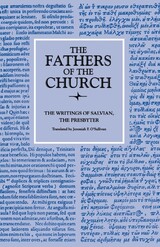
The Writings of Salvian, the Presbyter
The Presbyter Salvian, The Presbyter
Catholic University of America Press, 1947
No description available
[more]
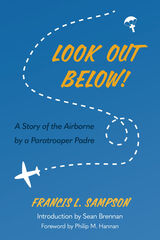
Look Out Below! A Story of the Airborne by a Paratrooper Padre
Francis L. Sampson
Catholic University of America Press, 2023
A veteran of the Second World War and the Korean War, Francis L. Sampson was a real-life hero whose exploits inspired one of the most famous war films of all time, Saving Private Ryan. From rural beginnings in northwestern Iowa, Sampson’s life would take him from the University of Notre Dame to the battlefields of Normandy on D-Day, the ambitious failure of Operation Market Garden, the harshness of a winter as a POW of the Germans during the closing stages of the Second World War, to the fall of North Korean capital Pyongyang in the early stages of the Korean War. Part of the very rare breed of Parachute Chaplains, in his case with the 101 st Airborne Division, Sampson spent much of his career as an army chaplain in the center
of maelstroms of the 20 th century. Throughout it all, Sampson offered a valuable Christian witness in the darkest of times and the most difficult of circumstances.
This second edition of his memoirs, Look Out Below! contains material on his service during the Korean War and occupation duty in Germany and Japan as well as the Second World War, with a new historical introduction by University of Scranton Professor Sean Brennan.
[more]

Light for the Nations
The Scriptures on the Universal Mission of Israel and the Church
Luis Sanchez-Navarro
Catholic University of America Press, 2024
Universality belongs to the very being of the Catholic Church. This claim of the Gospel is rooted in the ministry of Jesus, witnessed to by the canonical Gospels and the other books of the New Testament, all of which present the universal openness of salvation as a fulfillment of the Scriptures of Israel. In this book, after addressing the universality of salvation in the writings of the Old Covenant, we examine the differentiated and concordant witness of the synoptic Gospels, John and Paul, as well as the Letter to the Hebrews and the Apocalypse. In this way, we intend to show how this apostolic witness responds to the will of the Lord Jesus, while highlighting its harmony with Torah, Prophets and Writings.
Light for the Nations, by reviewing the main biblical passages on the universal dimension of salvation, aims to show how the fact that the Gospel of Jesus Christ has a claim to universality does not diminish, but rather enhances, the importance of the people of the first Covenant: Israel is called to be an active mediator of salvation. The canonical perspective is based on a differentiated exegetical study of each testimony. The scope is broad, since this theme of biblical theology is also relevant for Christology and soteriology, for anthropology and for ecclesiology. The main contribution lies in showing how the various biblical testimonies, in their diversity (which is fully taken into account), offer at the same time a concurring testimony on this fundamental question of Christian theology,
forming a true symphony within its polyphony.
[more]
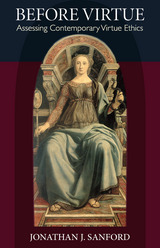
Before Virtue
Jonathan J. Sanford
Catholic University of America Press, 2015
Jonathan Sanford finds that despite the common origins of contemporary virtue ethics in Anscombe, the literature varies widely not just in its scope but in its basic commitments. What exactly is contemporary virtue ethics? In Before Virtue, Sanford develops strategies for describing contemporary virtue ethics accurately. He then assesses contemporary virtue approaches by the Anscombean dual standard which inspired them: the degree to which they avoid the pitfalls of modern moral philosophy and the extent to which they exemplify a successful recovery of an Aristotelian approach to ethics.
[more]
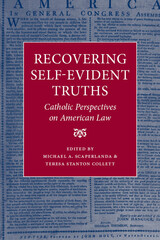
Recovering Self-Evident Truths
Catholic Perspectives on American Law
Michael A. Scaperlanda
Catholic University of America Press, 2007
This book presents an engaging collection of essays exploring "catholic" and "Catholic" perspectives on American law--catholic in their claims of universal truths, and Catholic in their grounding in the teachings of the Roman Catholic Church
[more]
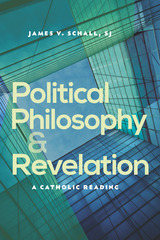
Political Philosophy and Revelation
James V. Schall, SJ
Catholic University of America Press, 2013
A collection of Fr. James Schall's recent essays, Political Philosophy and Revelation offers a learned, erudite, and coherent statement on the relationship between reason and revelation in the modern world. It addresses political philosophy in the context of an awareness of other humane and practical sciences, including history, literature, economics, theology, ethics and metaphysics.
[more]
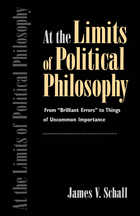
At the Limits of Political Philosophy
From "Brilliant Errors" to Things of Uncommon Importance
James V. Schall
Catholic University of America Press, 1996
James V. Schall presents, in a convincing and articulate manner, the revelational contribution to political philosophy, particularly that which comes out of the Roman Catholic tradition.
[more]
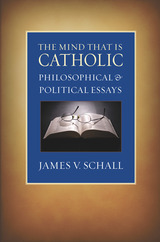
The Mind That Is Catholic
Philosophical and Political Essays
James V. Schall
Catholic University of America Press, 2008
The Mind That Is Catholic, he presents a retrospective collection of his academic and literary essays written in the past fifty years. In each essay, he exemplifies the Catholic mind at its best--seeing the whole, leaving nothing out.
[more]
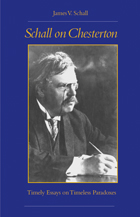
Schall on Chesterton
Timely Essays on Timeless Paradoxes
James V. Schall
Catholic University of America Press, 2000
In this book of essays, Father James V. Schall, a prolific author himself and a prominent Catholic writer, brings readers to Chesterton through a witty series of original reflections prompted by something Chesterton wrote--timely essays on timeless issues.
[more]
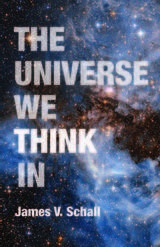
The Universe We Think In
James V. Schall
Catholic University of America Press, 2018
The Universe We Think In arises from a tradition of realism, both philosophical and political, a universe in which the common sense understanding of things is included in our judgement about them. The scope is both vast and narrow – vast because it
[more]
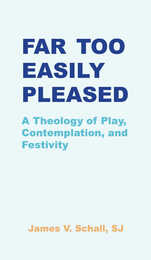
Far Too Easily Pleased
A Theology of Play, Contemplation, and Festivity
James V., SJ Schall
Catholic University of America Press, 2020
Far Too Easily Pleased was originally published in 1976, although it is just as relevant today. Catholic Education Press is thrilled to be able to bring this book back into print. To summarize the volume we can do better than to excerpt part of Fr. Schall’s introduction to the 1976 edition:
This book is intended to be a helpful stimulus to incite the reader to survey the truly exciting literature in this field and to assist in organizing personal reflection about the basic themes of game, play, wonder, rite, contemplation and festivity, themes that the theology of play naturally suggests. For it can be truly said that those who have not yet been initiated into this style of religious and cultural thought have been missing highly liberating and ennobling levels of our heritage. For those who already know what rewards are to be found in play and game, it is hoped that this book can again be a fresh and different approach to wonder and fascination, to the curiously marvelous life we have been given.
James V. Schall, SJ, (1928-2019) was an American Jesuit Roman Catholic priest, teacher, writer, and philosopher. He retired in 2012 after a long tenure as a professor of political philosophy at Georgetown University Among his many books are The Universe We Think In; Political Philosophy and Revelation: A Catholic Reading; The Mind That Is Catholic: Philosophical and Political Essays; Schall on Chesterton: Timely Essays on Timeless Paradoxes and At the Limits of Political Philosophy: From “Brilliant Errors” To Things of Uncommon Importance (all CUA Press).
[more]
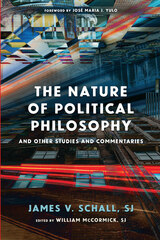
The Nature of Political Philosophy
And Other Studies and Commentaries
James V. Schall
Catholic University of America Press, 2022
In his final collection of essays, Father Schall explores the life of faith across a dazzling array of subjects, from Martin Luther to bioethics. With his characteristic patience, brilliance, and careful tenacity, Father Schall interrogates profoundly what it means to try to be a citizen of the Kingdom of God in the city of Man. Never shying away from controversy, across 14 articles and 4 book reviews Father Schall investigates the critical themes of his life and scholarship: reason and revelation; the nature of modernity; literature and salvation; metaphysics and politics; and much more.
Whether the reader is new to Father Schall or a longtime student, this posthumously-published collection of essays offers a profound meditation on the nature of political philosophy, and particularly what it would mean for Catholicism to offer a political philosophy. From such fundamental considerations, Schall explores ethical, literary and legal themes, displaying his typical breadth and depth of engagement with all that is real.
Ultimately, Father Schall leads one on a Socratic enterprise, an education whereby one comes to question for oneself basic assumptions, and to dig deeper into the first principles as they are recalled in the orders of knowledge and being. While Father Schall has passed on to his reward, this collection of essays helps ensure that his lessons continue to guide, challenge and enrich students for generations to come.
[more]
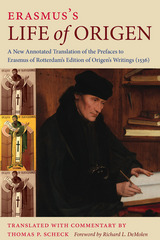
Erasmus's Life of Origen
Thomas P. Scheck
Catholic University of America Press, 2016
Erasmus of Rotterdam (1466-1536) hailed Origen of Alexandria (185-254) as a holy priest, a gifted homilist, a heroic Christian, and a celebrated exegete and theologian of the ancient Church. In this book Thomas Scheck presents one of the fruits of Erasmus's endeavors in the field of patristic studies (a particularly neglected field of scholarship within Erasmus studies) by providing the first English translation, annotated and thoroughly introduced, of Erasmus' final work, the Prefaces to his Edition of Origen's writings (1536). Originally published posthumously two months after Erasmus's death, the work surveys Origen of Alexandria's life, writings, preaching, and contribution to the Catholic Church. The staggering depth and breadth of Erasmus's learning are exhibited here, as well as the maturity of his theological reflections, which in many ways anticipate the irenicism of the Second Vatican Council with respect to Origen. Erasmus presents Origen as a marvelous doctor of the ancient Church who made a tremendous contribution to the Catholic exegetical tradition and who lived a saintly life.
[more]

The Family as Basic Social Unit
Living Out Catholic Social Teaching
Kevin Schemenauer
Catholic University of America Press, 2024
The Family as Basic Social Unit seeks to take seriously the claim that a family is a basic social unit. As a basic social unit, a family is both internally social, and socially interdependent with other communities. Since a family is a basic social unit, Schemenauer proposes that family life is a location for applying Catholic social teaching. Kevin Schemenauer specifically applies Catholic social principles concerning the dignity of work and peacemaking to household labor and violence among siblings, and he reflects on how individuals feed the hungry and care for the sick when they care for their family members. In the second part of the volume, Schemenauer describes the social interdependence of families. He analyzes the relationship between families and the Church, civil society, the economy, and the state. Schemenauer proposes that the question for families is not whether to engage with other social communities but how to do so well. He explicitly highlights how consumer capitalism creates obstacles for families attempting to live as a basic social unit. Then, employing the categories of infused simplicity and moral cooperation, he provides a framework for discerning family engagement with broader society. Finally, Schemenauer analyzes the relationship between family commitments and social ministry. Working from the family outward, Schemenauer describes how family commitments can motivate broader social service, but then employs the example of families involved in the Catholic Worker Movement to reflect on the joys and dangers of balancing commitment to one’s family with social ministry focused on the urgent needs of those outside of one’s household.
[more]
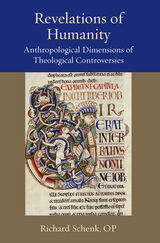
Revelations of Humanity
Anthropological Dimensions of Theological Controversies
Richard Schenk, OP
Catholic University of America Press, 2022
Revelations of Humanity brings together essays into the history and actuality of how our searches for God and for our own humanity are interwoven. They argue that the revelation of God is possible only when accompanied by a revelation of what it means to be a human being. Revelation implies that the truth is not fully evident in either case.
This quest is aided in many of the essays by a recollection of the thought of Thomas Aquinas. As opposed to simple memory, recollection implies that memory has been lost or become clouded, here by the misrepresentation of Thomas’ view of humanity’s relation to God as harmonistic, at best semi-Pelagian, often even naturalistic. This difficult recovery is made possible by historical research that alone can escape the easy systematic alienation that supporters and critics of Thomas have often brought to their interpretation of his works. Thomas’s sense of a real but finite capacity of human beings for God, his grace and revelation, anticipates in more ways than is commonly known much of contemporary suspicion about human capacities, but in ways that are open to God. That programmatic insight into the historical Thomas, keenly aware of human entanglements, limits and hopes, offers on many contemporary issues a ressourcement of systematic thought.
Revelations of Humanity revolves around three clusters of issues. The first asks about the reality and limits of the human capacity for truth: in metaphysical, moral and political matters and in relation to the disputed issues of analogous reason and faith. The second cluster is structured around the four involvements that the Second Vatican Council identified as the human face of genuine Christian existence: participation in the legitimate joys, hopes, sorrows and fears of the contemporary world. These are refracted in the broken light of the human proprium of risibility, the abiding uncertainty addressed by hope, the disputed question of a suffering God and the recollection of Christ’s anxiety in the face of death. The final cluster brings together anthropological dimensions of current ecumenical and interreligious disputes: the need to complement affirmation with admonition in ecumenical conversation, exemplified by the ambivalence towards sacrifice in a genuinely Catholic theology and the need to avoid the excesses of univocity, equivocity or an all too facile analogy in the determination of interreligious relationalities.
[more]
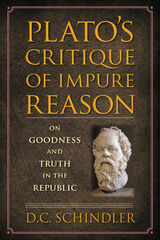
Plato's Critique of Impure Reason
On Goodness and Truth in the Republic
D. C. Schindler
Catholic University of America Press, 2008
Plato's Critique of Impure Reason offers a dramatic interpretation of the Republic, at the center of which lies a novel reading of the historical person of Socrates as the "real image" of the good
[more]
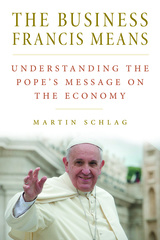
The Business Francis Means
Understanding the Pope's Message on the Economy
Martin Schlag
Catholic University of America Press, 2017
Pope Francis, generally speaking, has thus far chosen to concentrate his papacy on social justice issues, as opposed to doctrinal or liturgical issues. This has led to Francis being hailed as a hero to many on the left, while it has made some conservative supporters of St. John Paul II and Pope Emeritus Benedict XVI disappointed and uncomfortable, even as they love and appreciate his person and gestures of mercy and compassion. Some find his teachings difficult to embrace, especially those concerning business and the economy. Pope Francis has spoken of building bridges as part of what it is to be Christian, but aspects of his message seem to be just constructing walls between the Holy Father and groups of the faithful.
The Business Francis Means aims to break through these walls, showing that Pope Francis has something to say to all Christians. His message, taken as a whole, keeps us from dividing the “seamless garment” of Christ: he reminds the conservatives of the problems of inequality and poverty, and the liberals that social justice is not enough – the Church is the bride of Christ, not a social institution or an NGO.
Monsignor Martin Schlag summarizes and explains the message of Pope Francis on business and the economy in this compact volume. The Business Francis Means will be of great interest to the Catholic layperson, especially one involved in political or economic life.
The Business Francis Means aims to break through these walls, showing that Pope Francis has something to say to all Christians. His message, taken as a whole, keeps us from dividing the “seamless garment” of Christ: he reminds the conservatives of the problems of inequality and poverty, and the liberals that social justice is not enough – the Church is the bride of Christ, not a social institution or an NGO.
Monsignor Martin Schlag summarizes and explains the message of Pope Francis on business and the economy in this compact volume. The Business Francis Means will be of great interest to the Catholic layperson, especially one involved in political or economic life.
[more]
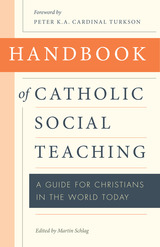
Handbook of Catholic Social Teaching
A Guide for Christians in the World Today
Martin Schlag
Catholic University of America Press, 2017
Handbook of Catholic Social Teaching employs a question and answer format, to better accentuate the response of the Church's message to the questions Catholics have about their social role and what the Church intends to teach about it. Written in consultation with the Pontifical Council for Justice and Peace, the Handbook should take its place alongside the Catechism of the Social Doctrine of the Church on the shelf of informed Catholics as works that can inform what we believe and do in the public sphere.
[more]
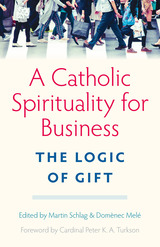
A Catholic Spirituality for Business
Martin Schlag
Catholic University of America Press, 2019
Spirituality and gift are notions that are en vogue. Topics such as spirituality at the workplace, spirituality management, spirituality in leadership, organizational spirituality and other related topics are trending in management literature. The “logic of gift” is also appearing more frequently, especially in attempts to rethink the way our economy works in order to include the marginalized.
<
The expression “logic of gift” was introduced into official Catholic social teaching by Pope Benedict XVI, who presented it in association with the principle of gratuitousness, which in turn is an expression of fraternity. However, before Caritas in Veritate and ever since Marcel Mauss’s groundbreaking work The Gift, the importance of gift for human relationships and for the cohesion of society had been increasingly recognized. Alain Caillé and Jacques T. Godbout further fleshed out the implication of gift for contemporary society in the context of secular social sciences, striving to overcome utilitarianism. It was the “civil economy” movement, however, that exercised greatest influence on Benedict XVI’s encyclical Caritas in Veritate
This present volume reflects on the general scope of these notions for business and society. This is done by structuring the book in two parts, each dedicated to one of the two concepts. Each part has two general chapters and two that apply the notions to business and to business education. The authors are a mix of well-known emeritus professors and younger talented emerging scholars. We have also been careful to combine European with American authors.
A Catholic Spirituality for Business: The Logic of Gift does not seek to provide a definitive answer to all social challenges, but to make a contribution to a better understanding of Christian spirituality and gift in connection with business organizations. The authors in this book are convinced that markets can be ethical and social, that moral change towards ethical capitalism is possible.
<
The expression “logic of gift” was introduced into official Catholic social teaching by Pope Benedict XVI, who presented it in association with the principle of gratuitousness, which in turn is an expression of fraternity. However, before Caritas in Veritate and ever since Marcel Mauss’s groundbreaking work The Gift, the importance of gift for human relationships and for the cohesion of society had been increasingly recognized. Alain Caillé and Jacques T. Godbout further fleshed out the implication of gift for contemporary society in the context of secular social sciences, striving to overcome utilitarianism. It was the “civil economy” movement, however, that exercised greatest influence on Benedict XVI’s encyclical Caritas in Veritate
This present volume reflects on the general scope of these notions for business and society. This is done by structuring the book in two parts, each dedicated to one of the two concepts. Each part has two general chapters and two that apply the notions to business and to business education. The authors are a mix of well-known emeritus professors and younger talented emerging scholars. We have also been careful to combine European with American authors.
A Catholic Spirituality for Business: The Logic of Gift does not seek to provide a definitive answer to all social challenges, but to make a contribution to a better understanding of Christian spirituality and gift in connection with business organizations. The authors in this book are convinced that markets can be ethical and social, that moral change towards ethical capitalism is possible.
[more]

Free Markets with Solidarity and Sustainability
Martin Schlag
Catholic University of America Press, 2016
The contributors to Free Markets with Sustainability and Solidarity, who represent a unique combination of European and American scholars, present their reflections on evolving forms of economics. All are unified by a holistic, Christian anthropology, from which they draw epistemological consequences for free markets and a free society.
[more]
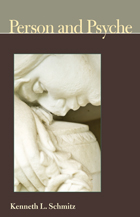
Person and Psyche
Kenneth L. Schmitz
Catholic University of America Press, 2009
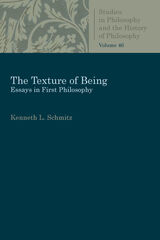
The Texture of Being
Essays in First Philosophy
Kenneth L. Schmitz
Catholic University of America Press, 2007
Diverse in topics yet unified in purpose, this volume brings together Schmitz's penetrating and rich insight into being, produced over many years, to offer readers a magisterial study from one of the great Christian philosophers of our time.
[more]
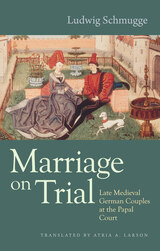
Marriage on Trial
Ludwig Schmugge
Catholic University of America Press, 2012
This work vividly describes many of the individual cases and offers new insight into the social and legal pressures on marriage in the Middle Ages.
[more]
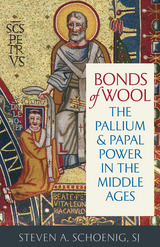
Bonds of Wool
The Pallium and Papal Power in the Middle Ages
Steven A. Schoenig
Catholic University of America Press, 2016
The pallium was effective because it was a gift with strings attached. This band of white wool encircling the shoulders had been a papal insigne and liturgical vestment since late antiquity. It grew in prominence when the popes began to bestow it regularly on other bishops as a mark of distinction and a sign of their bond to the Roman church. Bonds of Wool analyzes how, through adroit manipulation, this gift came to function as an instrument of papal influence. It explores an abundant array of evidence from diverse genres - including chronicles and letters, saints' lives and canonical collections, polemical treatises and liturgical commentaries, and hundreds of papal privileges - stretching from the eighth century to the thirteenth and representing nearly every region of Western Europe. These sources reveal that the papal conferral of the pallium was an occasion for intervening in local churches throughout the West and a means of examining, approving, and even disciplining key bishops, who were eventually required to request the pallium from Rome.
[more]
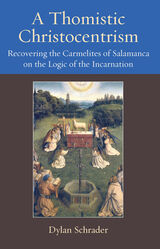
A Thomistic Christocentrism
Recovering the Carmelites of Salamanca on the Logic of the Incarnation
Dylan Schrader
Catholic University of America Press, 2021
Saint Thomas Aquinas famously held the opinion that, in God’s actual plan for the world, the Word would not have become flesh except to redeem us from sin. Conversely, Blessed John Duns Scotus argued that God intended Christ first, such that Christ would have come even if there had been no sin. While Aquinas and Scotus were far from the first to consider this question, they became emblematic of two seemingly irreconcilable approaches. In this book, Father Dylan Schrader recovers the thought of the Salmanticenses, the Discalced Carmelites writing at the University of Salamanca in the seventeenth century. The Salmanticenses argue that Christ is primary in God’s intention precisely as redeemer, so that it is true both that God has made everything else for the sake of Christ and that Christ’s coming is essentially redemptive, connected with sin. In this way, the Salmanticenses offer a Thomistic Christocentrism.
This book summarizes the historical background to the Salmanticenses, from the time of Anselm up through the early-modern period. Next, it presents and defends the Salmanticenses’ argument for the primacy of Christ the redeemer. A Thomistic Christocentrism then turns to two key post-conciliar figures, Karl Rahner and Hans Urs von Balthasar. Rahner sees Christ as the culmination of the world’s opening up to God. Balthasar sees Christ as the reconciler of divine and human freedom through his cross, descent, and resurrection. Both Christocentric approaches have good aspirations but suffer from serious flaws. In its final chapters, this book applies the Salamanca theory to Rahner and Balthasar, showing its enduring value for post-conciliar Christocentrism.
[more]
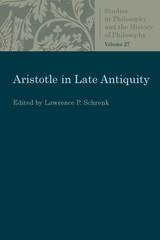
Aristotle in Late Antiquity
Lawrence P. Schrenk
Catholic University of America Press, 2018
Consisting of nine studies, this volume presents a series of specific insights on Aristotle's influence from Plotinus through Arabic thought.
[more]
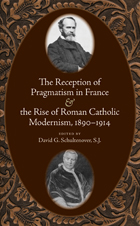
The Reception of Pragmatism in France and the Rise of Roman Catholic Modernism, 1890-1914
David G. Schultenover
Catholic University of America Press, 2009
This collection of essays provides a small revolution in the study of Roman Catholic Modernism, a movement that until now has been largely seen as an episode that underscored institutional Catholicism's isolation from the mainstream intellectual currents of the time.
[more]
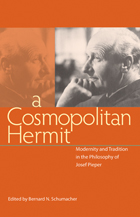
A cosmopolitan hermit
modernity and tradition in the philosophy of Josef Pieper
Bernard N Schumacher
Catholic University of America Press, 2009
Composed of ten original essays written with the goal of exploring the thought of one of the most significant German philosophers of the 20th century, namely, Josef Pieper (1904-1997), this book is the only systematic treatment of his expansive philosophy to date.
[more]
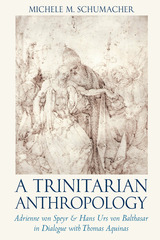
A Trinitarian Anthropology
Adrienne von Speyr & Hans Urs von Balthasar in Dialogue with Thomas Aquinas
Michele M. Schumacher
Catholic University of America Press, 2014
In this magisterial work, Michele M. Schumacher seeks to promote dialogue between disciples of the Swiss theologian Hans Urs von Balthasar (d. 1988) and those of the church's common doctor, St. Thomas Aquinas (d. 1274) on a critical theological question. How are analogies and metaphors from the philosophy and theology of the person (anthropology) rightly used to address the mystery of the Trinity? She does so by considering the specific setting of Balthasar's theology: the inseparability of his work from that of the Swiss physician and mystic Adrienne von Speyr (d. 1967).
[more]
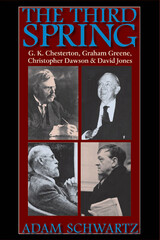
The third spring
G.K. Chesterton, Graham Greene, Christopher Dawson, and David Jones
Adam Schwartz
Catholic University of America Press, 2005
This book is the first detailed examination of these four authors as part of a Roman Catholic, counter-modern community of discourse. It is informed by extensive research in the writers' works, scholarship on them, and their personal papers.
[more]
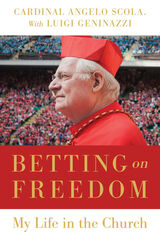
Betting on Freedom
My Life in the Church
Carinal Angelo Scola
Catholic University of America Press, 2021
In this wide-ranging conversation with the Italian journalist Luigi Geninazzi, Cardinal Angelo Scola discusses both the salient moments of his own life and the path and situation of the Church and society in Europe over the last half-century. The Cardinal recounts his life, speaking of the extraordinary gift of particular friendships he has had, starting with Luigi Giussani, founder of the ecclesial movement Communion and Liberation (CL), and moving on to discuss Hans Urs von Balthasar, Henri De Lubac, and Joseph Ratzinger.
A figure who bridges the past three pontificates, Scola discusses his relationships with St. John Paul II, by whom he was nominated a bishop at the relatively young age of forty nine; Benedict XVI, with whom he has had an intense intellectual friendship for decades; and Pope Francis, of whom he speaks with affection and hope.
At the center of this rich fresco of anecdotes and reflections stands a crucial question: what is the true path of the Church today? Between those who reduce Christianity to a mere civil religion and those who propose a purist return to the Gospel, the cardinal indicates a "third way" by betting on the freedom of the human person to recognize the supreme value of Christ. This is at the same time a bet on the active commitment of believers to contribute, starting from faith, to the birth of a new Europe, inevitably more diverse but no loss of its identity.
[more]

A Historian and His World
A Life of Christopher Dawson, 1889-1970
Christina Scott
Catholic University of America Press, 2023
The English historian of culture Christopher Dawson (1889-1970) was an independent scholar and the author of more than twenty books. He served as assistant lecturer in the History of Culture, University College, Exeter (1925), Forwood Lecturer in the Philosophy of Religion, University of Liverpool (1934), Gifford Lecturer at the University of Edinburgh (1947-1949), and as Professor of Catholic Studies at Harvard University (1958-1962). He was elected Fellow of the British Academy in 1943 and edited the Dublin Review during the Second World War. This biography by Christina Scott, Dawson’s daughter, is a sensitive portrait of a complex and fascinating scholar.
Unlike other English Christian converts of the twentieth century who excelled in literature, like G. K. Chesterton or C. S. Lewis, Dawson turned to the social sciences. He drew from the new idea of culture as a common way of life emerging from anthropology at the time of the Great War to shape a new approach to history. His study of the intimate relationship between religion and culture throughout world history shaped his trenchant criticisms of his own times. He wrote in 1955 that, “the first step in the transformation of culture is a change in the pattern of culture within the mind, for this is the seed out of which there spring new forms of life which ultimately change the social way of life and thus create a new culture.” Dawson’s engagement with anthropology and the idea of culture marked an important moment of development in the Catholic intellectual tradition.
Christina Scott shows that Dawson is best understood as he himself interpreted his historical subjects—in the context of “the spiritual world in which he lived, the ideas that moved him, and the faith that inspired his action.” Dawson was not a historian of ideas for their own sake; he had a passionate belief in their liberating power. A Historian and His World will be of interest to intellectual historians, historians of religion and culture, and students of modern Catholic thought. The Introduction is written by Dawson scholar Joseph T. Stuart and the book is graced by a postscript by Christopher Dawson reflecting upon the meaning of his work.
[more]
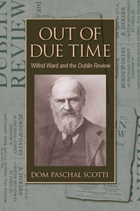
Out of due time
Wilfrid Ward and the Dublin review
Paschal Scotti
Catholic University of America Press, 2006
Following the tradition of the great literary quarterlies, the journal discussed every aspect of human endeavor, and Out of Due Time offers a fine opportunity to view the best of the Catholic mind in an extraordinary period.
[more]
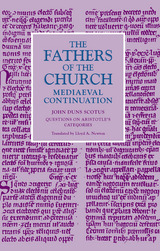
Questions on Aristotle's Categories
John Duns Scotus
Catholic University of America Press, 2014
This work is the first English translation of Scotus's commentary on Aristotle's Quaestiones super Praedicamenta. Although there are numerous Latin commentaries on Aristotle's Categories, Scotus's Questions is one of the few commentaries on the Categories written in the thirteenth century covering all of Aristotle's text, including the often neglected post-praedicamenta, and the only complete Latin commentary available in English. Moreover, unlike many of the commentaries, Scotus's text is one of the last commentaries to be written before the nominalist reduction of the categories to substance and quality. The question format allows Scotus a great deal of liberty to discuss the categories in detail, as well as matters that are only remotely raised by the text. Altogether, the forty-four questions cover the following subjects: questions 1-4 are prolegomena to the work itself and raise the question of its subject matter as well as whether there can be a science of the categories; questions 5-8 deal with equivocals, univocals, and denominatives; questions 9-11 discuss Aristotle's two rules regarding predication and the sufficiency of the categories; questions 12-36 discuss the four main categories treated by Aristotle, namely, substance, quantity, relation, and quality; and the remaining eight questions discuss the post-praedicamenta.
[more]
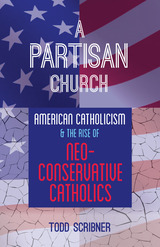
A Partisan Church
Todd Scribner
Catholic University of America Press, 2015
In the wake of Vatican II and the political and social upheavals of the 1960s, disruption and disagreement rent the Catholic Church in America. Since then a diversity of opinions on a variety of political and religious questions found expression in the church, leading to a fragmented understanding of Catholic identity. Liberal, conservative, neoconservative and traditionalist Catholics competed to define what constituted an authentic Catholic worldview, thus making it nearly impossible to pinpoint a unique "Catholic position" on any given topic. A Partisan Church examines these controversies during the Reagan era and explores the way in which one group of intellectuals - well-known neoconservative Catholics such as George Weigel, Michael Novak, and Richard John Neuhaus - sought to reestablish a coherent and unified Catholic identity.
[more]
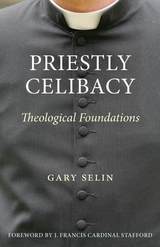
Priestly Celibacy
Gary B. Selin
Catholic University of America Press, 2016
Pope Francis has called mandatory priestly celibacy a "gift for the Church," but added "since it is not a dogma, the door is always open" to change. As this Church discipline continues to be debated, it is important for Catholics to delve into the theological and not merely pragmatic reasons behind its continuation. Priestly Celibacy: Theological Foundations, therefore, fills a critical gap in the current theological literature on this important topic of ecclesial ministry and life, and also helps to contribute to the advancement of the rather underdeveloped theology of priestly celibacy.
[more]
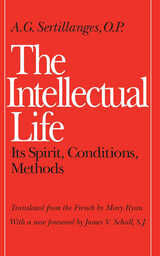
The Intellectual Life
A. G. Sertillanges
Catholic University of America Press, 1992
"Fr. Sertillanges's teachings are as timeless as any truths which describe the genuine nature of things. . . . This book is highly recommended not only for intellectuals, but also for students and those discerning their vocation in life."—New Oxford Review
"[This] is above all a practical book. It discusses with a wealth of illustration and insight such subjects as the organization of the intellectual worker's time, materials, and his life; the integration of knowledge and the relation of one's specialty to general knowledge; the choice and use of reading; the discipline of memory; the taking of notes, their classification and use; and the preparation and organization of the final production."—The Sign
[more]
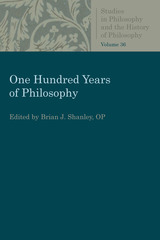
One Hundred Years of Philosophy
Brian Shanley
Catholic University of America Press, 2019
This collection originated in the centenary celebration of the School of Philosophy at The Catholic University of America. Written by acknowledged experts in their fields, the essays provide a unique overview of philosophical developments in the twentieth century. The broad range of topics considered makes the book an invaluable reference work.
[more]
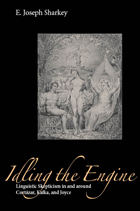
Idling the Engine
Linguistic sSkepticism in and around Cortázar, Kafka, and Joyce
E. Joseph Sharkey
Catholic University of America Press, 2006
Author E. Joseph Sharkey uses the philosophies of language of Hans-Georg Gadamer and Ludwig Wittgenstein to counter the skepticism in question by showing that a language grounded in history instead of the transcendent is grounded nevertheless.
[more]
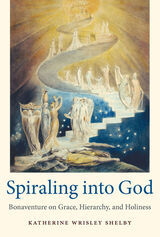
Spiraling Into God
Bonaventure on Grace, Hierarchy , and Holiness
Katherine Wrisley Shelby
Catholic University of America Press, 2023
Spiraling into God: Bonaventure on Grace, Hierarchy, and Holiness offers a systematic account of the Seraphic Doctor’s doctrine of grace across his speculative-academic, mystical, hagiographical, and pastoral texts. It does so by arguing that an account of this kind can only be provided by also attending to his theology of hierarchy, a methodology derived from Bonaventure’s claim in the Major Legend of St. Francis that Francis of Assisi was a “vir hierarchicus,” or hierarchical man. As the book explores in great depth, this appellation relies upon Bonaventure’s reading of a Victorine Dionysian interpreter by the name of Thomas Gallus, whose “angelic anthropology”—or notion of the hierarchical soul—becomes a crucial component within the Seraphic Doctor’s teaching on grace as he interprets the sanctity of St. Francis. Throughout the course of his career, Bonvaenture will define sanctifying grace as a created “inflowing” (influentia) that “hierarchizes” human beings by purifying, illuminating, and perfecting them from within, thus causing them to become a similitude of the Trinity. This book explains what this means and why it matters.
Most existing scholarship on this subject in Bonaventure’s thought interprets it as a subtopic with respect to other themes—for example, with respect to his Christology or his Trinitarian theology—rather than taking the time to understand his doctrine of grace in its own right. Alternatively, scholarly treatments of his doctrine of grace will treat it at length, but will only examine the topic as it appears in his more speculative-academic texts—most especially his Commentary on the Sentences or his famous Itinerarium Mentis in Deum—without bringing these into conversation with his pastoral works, sermon literature, or hagiographical texts. This book provides the first unified treatment of Bonaventure’s doctrine of grace across all these different genres of his known corpus, and in so doing, fills a massive lacuna in both Bonaventurean scholarship and in the field of medieval historical theology.
[more]
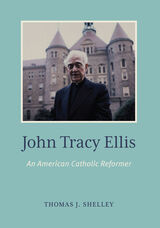
John Tracey Ellis
An American Church Reformer
Thomas J. Shelley
Catholic University of America Press, 2023
For several decades prior to his death in October1992, Monsignor John Tracy Ellis was the most prominent historian of American Catholicism. His bibliography lists 395 published works, including seventeen books, most famously, American Catholics and the Intellectual Life, a scathing indictment of the mediocrity of Catholic higher education and a clarion call for American Catholics to make a greater contribution to American intellectual life. Ellis’s ecumenically-minded scholarship led to his election in 1969 as the President of both the American Catholic Historical Association and the predominantly Protestant American Society of Church History.
As a professor at the Catholic University of America, Ellis trained numerous graduate students, who made their own contributions to American Catholic history, and he also furthered the careers of several talented young church historians. Especially in his later years, during the polarized atmosphere that followed Vatican II, Ellis became an outspoken but balanced advocate of reform in the Church, urging greater transparency and honesty, collegiality on the diocesan level, a role for the laity in the selection of bishops, reassessment of church teaching on birth control, decentralization to provide an enhanced role for the local churches, and an eloquent defense of religious freedom and the American Catholic commitment to separation of church and state.
His fellow church historian, Jay P. Dolan, remarked that Ellis “used history as an instrument to promote changes he believed necessary for American Catholicism. . . .No other historian of American Catholicism matched Ellis in this regard.”
[more]
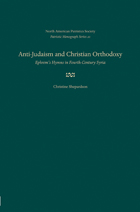
Anti-Judaism and Christian Orthodoxy
Ephrem's Hymns in Fourth-century Syria (Patristic Monograph Series)
Christine Shepardson
Catholic University of America Press, 2008
This book investigates the complex anti-Jewish and anti-Judaizing rhetoric of Ephrem, a fourth-century poet, deacon, and theologian from eastern Roman Syria whose Syriac-language writings remain unfamiliar and linguistically inaccessible to centuries of scholars who study the well-known Greek and Latin writings of his contemporaries.
[more]
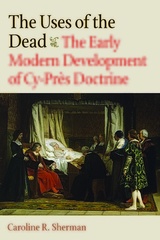
The Uses of the Dead
Caroline R. Sherman
Catholic University of America Press, 2017
Cy-près doctrine, which allows the purpose of a failing or impractical charitable gift to be changed, has been understood since the eighteenth century as a medieval canon law principle, derived from Roman law, to rescue souls by making good their last charitable intentions. The Uses of the Dead offers an alternate origin story for this judicial power, grounded in modern, secular concerns.
Posthumous gifts, which required no sacrifice during life, were in fact broadly understood by canon lawyers and medieval donors themselves to have at best a very limited relationship to salvation. As a consequence, for much of the Middle Ages the preferred method for resolving impossible or impractical gifts was to try to reach a consensus among all of the interested parties to the gift, including the donor's heirs and the recipients, with the mediation of the local bishop.
When cy-près emerged in the seventeenth century, it cut a charitable gift o from return to the donor's estate in the event of failure. It also gave the interested parties to the gift (heirs, beneficiaries, or trustees) little authority over resolutions to problematic gifts, which were now considered primarily in relationship to the donor's intent—even as the intent was ultimately honored only in its breach. The Uses of the Dead shows how cy-près developed out of controversies over church property, particularly monastic property, and whether it might be legally turned over to fund education, poor relief, or national defense.
Renaissance humanists hoped to make better, more prudent uses of property; the Reformation sought to correct superstitious abuses of property and ultimately tended to prevent donors' heirs from recovering secularized ecclesiastical gifts; and the early modern state attempted to centralize poor relief and charitable efforts under a more rational, centralized supervision. These three factors combined to replace an older equitable ideal with a new equitable rule—one whose use has rapidly expanded in the modern era to allow assorted approximations and judicial redistributions of property.
Posthumous gifts, which required no sacrifice during life, were in fact broadly understood by canon lawyers and medieval donors themselves to have at best a very limited relationship to salvation. As a consequence, for much of the Middle Ages the preferred method for resolving impossible or impractical gifts was to try to reach a consensus among all of the interested parties to the gift, including the donor's heirs and the recipients, with the mediation of the local bishop.
When cy-près emerged in the seventeenth century, it cut a charitable gift o from return to the donor's estate in the event of failure. It also gave the interested parties to the gift (heirs, beneficiaries, or trustees) little authority over resolutions to problematic gifts, which were now considered primarily in relationship to the donor's intent—even as the intent was ultimately honored only in its breach. The Uses of the Dead shows how cy-près developed out of controversies over church property, particularly monastic property, and whether it might be legally turned over to fund education, poor relief, or national defense.
Renaissance humanists hoped to make better, more prudent uses of property; the Reformation sought to correct superstitious abuses of property and ultimately tended to prevent donors' heirs from recovering secularized ecclesiastical gifts; and the early modern state attempted to centralize poor relief and charitable efforts under a more rational, centralized supervision. These three factors combined to replace an older equitable ideal with a new equitable rule—one whose use has rapidly expanded in the modern era to allow assorted approximations and judicial redistributions of property.
[more]
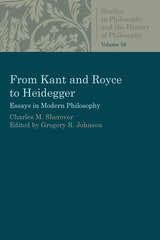
From Kant and Royce to Heidegger
Essays in Modern Philosophy
Charles Sherover
Catholic University of America Press, 2019
In this study, Charles M. Sherover argues that there is a single, substantial line of development that can be traced from the work of Leibniz through Kant and Royce to Heidegger. Sherover traces a movement from deep within the roots of German idealism through Royce's insights into American pragmatism to the ethical ramifications of Heidegger's existential phenomenology, and then provides an analysis of the neglected ethical and political implications of Heidegger's Being and Time. The essays lead finally to Sherover's own view of the self as a member of a moral and political community.
[more]
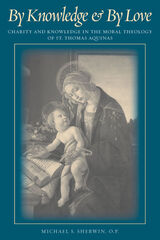
By knowledge & by love
charity and knowledge in the moral theology of St. Thomas Aquinas
Michael S. Sherwin
Catholic University of America Press, 2005
By Knowledge and By Love represents a major contribution to Thomistic moral theology and philosophy by providing a thoughtful examination of Aquinas' psychology of action and his theology of charity.
[more]
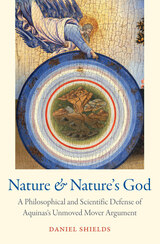
Nature and Nature's God
A Philosophical and Scientific Defense of Aquinas' Unmoved Mover Argument
Daniel Shields
Catholic University of America Press, 2023
Aquinas’ first proof for God’s existence is usually interpreted as a metaphysical argument immune to any objections coming from empirical science. Connections to Aquinas’ own historical understanding of physics and cosmology are ignored or downplayed. Nature and Nature's God proposes a natural philosophical interpretation of Aquinas’ argument more sensitive to the broader context of Aquinas’ work and yielding a more historically accurate account of the argument. Paradoxically, the book also shows that, on such an interpretation, Aquinas’ argument is not only consistent with modern science, but actually confirmed by the history of science, from classical mechanics through 19th century thermodynamics to contemporary cosmology.
The first part of the book considers Aquinas’ argument in its historical context, exploring the key principles that everything in motion is moved by something else and that an infinite regress of causes is impossible. The structure of the First Way is analyzed and the argument is connected both with Aquinas’ Third Way—a new interpretation of which is also proposed—and Aquinas’ second proof from motion in the Summa contra Gentiles. To complete the account of what natural philosophy—prior to metaphysics—can demonstrate about God, a chapter on Aquinas’ teleological argument (the Fifth Way) is also included.
The second part of the book tracks the history of modern science from Copernicus to today, showing how Aquinas’ argument fared at each major turn. The first chapter shows how Newton’s understanding of inertia and conservation of momentum supports the idea that motion cannot continue forever without God’s causality, and integrates a modern understanding of inertia and gravity with the principles of Thomistic natural philosophy. The second chapter considers the first and second laws of thermodynamics, showing how they too support Aquinas’ contention that motion cannot continue forever without God’s causality. This chapter also discusses statistical mechanics and contemporary cosmology, demonstrating that science continues to support Aquinas’ unmoved mover argument. The final chapter turns to modern biology as well as cosmological fine-tuning to show that modern science also continues to support Aquinas’ teleological argument. The result is not only a satisfying defense of Aquinas’ natural philosophical proofs for God’s existence, but a primer on the broader project of integrating Thomistic natural philosophy with modern science.
[more]
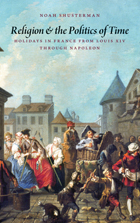
Religion and the Politics of Time
Noah Shusterman
Catholic University of America Press, 2010
Religion and the Politics of Time is an extensive study of the changes in religious holidays in Old Regime and Revolutionary France.
[more]
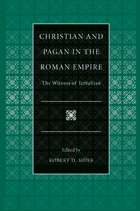
Christian and Pagan in the Roman Empire
Robert Sider
Catholic University of America Press, 2001
In this volume, Robert D. Sider undertakes a judicious pruning of the original texts and brings a fresh accessibility to the important writings of Tertullian.
[more]
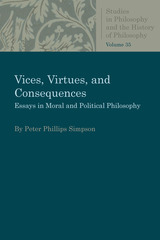
Vices, Virtues, and Consequences
Essays in Moral and Political Philosophy
Peter Simpson
Catholic University of America Press, 2019
Vices, Virtues, and Consequences offers a broad study of the basic and universal issues in ethics and politics, the issues of what the human good is and how to attain it and avoid its opposite. These questions have long been debated and are no less debated today. However, according to author Peter Phillips Simpson, within the mainstream of Anglo-American modern philosophy they have been debated too narrowly. This narrowness is one of our modern vices, and it does much to encourage other vices, in particular that of despair of universal and objective reason. The essays in this collection not only attack these vices, but also attempt to replace them with the contrary virtues.
[more]
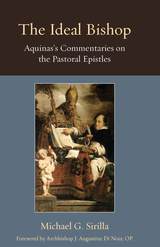
The Ideal Bishop
Michael G. Sirilla
Catholic University of America Press, 2017
St. Thomas Aquinas’s commentaries on the Pastoral Epistles are distinctive and overlooked theological resources, offering invaluable insights into the exercise of the episcopal office in bringing about the spiritual perfection of the faithful in Christ. The Ideal Bishop includes a review of the theology of the episcopacy found in St. Thomas’s principal contemporaries, including Peter Lombard, St. Albert the Great, and St. Bonaventure of Bagnoregio. The heart of this book is an examination of the theology and spirituality of the episcopacy found in the lectures on 1 Timothy, 2 Timothy, and Titus. Particular attention is devoted to Aquinas’s treatment of the nature, purpose, requisite virtues, disqualifying vice, special duties, and particular graces of the episcopal office.
[more]
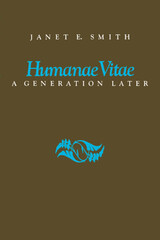
Humanae vitae, a generation later
Janet E Smith
Catholic University of America Press, 1991
Janet E. Smith presents a comprehensive review of this issue from a philosophical and theological perspective. Tracing the emergence of the debate from the mid-1960s and reviewing the documents from the Special Papl Commission established to advise Pope Paul VI, Smith also examines the Catholic Church's position on marriage, which provides context for its condemnation of contraception.
[more]

The House of the Lord
Steven Smith
Catholic University of America Press, 2017
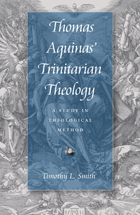
Thomas Aquinas' Trinitarian Theology
A Study in Theological Method
Timothy L Smith
Catholic University of America Press, 2003
Thomas' presentation of Trinitarian doctrine in his Summa Theologiae is an essential text for anyone interested in the great Dominican's theology. One finds here the meeting of a host of philosophical and theological issues.
[more]
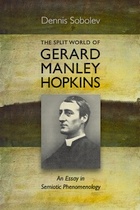
The Split World of Gerard Manley Hopkins
Dennis Sobolev
Catholic University of America Press, 2011
For the first time in almost half a century, the world of Hopkins is examined as an indivisible whole. The Split World of Gerard Manley Hopkins is a synthetic study of Hopkins's writings, written within a framework of semiotic phenomenology.
[more]
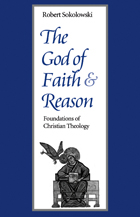
The God of Faith and Reason
Robert Sokolowski
Catholic University of America Press, 1995
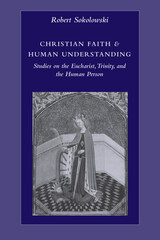
Christian faith & human understanding
studies on the Eucharist, Trinity, and the human person
Robert Sokolowski
Catholic University of America Press, 2006
In this collection of essays, renowned philosopher Robert Sokolowski illustrates how Christian faith is not an alternative to reason, but rather an enhancement of it.
[more]
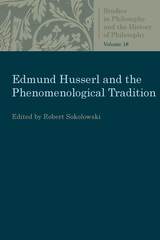
Edmund Husserl and the Phenomenological Tradition
Robert Sokolowski
Catholic University of America Press, 2018
A collection of papers meant to illustrate the richness of Edmund Husserl's own work and the tradition he began.
[more]

Eucharistic Presence
A Study in the Theology of Disclosure
Robert Sokolowski
Catholic University of America Press, 1994
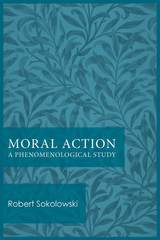
Moral Action
A Phenomenological Study
Robert Sokolowski
Catholic University of America Press, 2017
“In this carefully written study of the constituents of human decision making, Robert Sokolowski lays an elaborate groundwork to develop the importance of the distinction between choice and the voluntary in moral discourse…offers a new way of looking at m
[more]
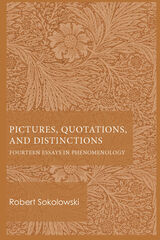
Pictures, Quotations, and Distinctions
Fourteen Essays in Phenomenology
Robert Sokolowski
Catholic University of America Press, 2022
One of the major contributions of Husserl’s phenomenology has been to show that things present themselves to us in strikingly different ways. There are various kinds of presentations and something like logical structures in them that allow the truth of things to appear. Being pictured is different from being named, and also different from being distinguished from something else. The fourteen essays in this volume provide concrete and colorful examples of strategic forms of presentation, and they also shed light on us as persons who exercise our intelligence when we let things appear in these various ways. Even our moral conduct takes place because something appears to us as to be done or to be avoided in a situation that calls for action.
When we quote what someone has said, for example, we express things as they have been expressed by someone else, and we invoke the authority of that other speaker. In measurement, we either bring external units, such as inches or yards, to determine the “how much” of things; or we engage in “internal measurement” and use one part of the object to determine the size of the whole. In moral action, the deep core of what we do involves either benevolence or malevolence, and in such conduct we shape or confirm ourselves as good or bad. Even the timing of things, the measurement of their motions and the determination of their before and after, in both clock and calendar time, cannot take place without the involvement of the person’s own interwoven perceptions, remembrances, and anticipations, all held together by the underlying flow of personal as well as worldly temporality.
The essays in this book are an attempt to blend the philosophical approaches of Aristotle and Husserl, the classical and the modern, to help us appreciate what Aristotle called “being as the true,” and to show how the human person is involved in this enterprise.
[more]
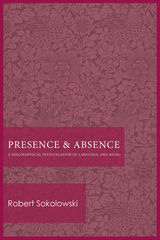
Presence and Absence
A Philosophical Investigation of Language and Being
Robert Sokolowski
Catholic University of America Press, 2017
“Presence and Absence is a book of importance for all who are actively engaged in the philosophical enterprise, whatever their differing persuasions. It shows philosophy to be flourishing in the midst of its own self-proclaimed signs of morbidity.” – The Review of Metaphysics
“A splendid, provocative and profound work, this book explores the manifold ways in which the contrast of presence and absence operate to establish the possibility of human discourse and truthfulness…belongs in every philosophy collection.” – Choice
“Quite simply a superb book, which deserves more than one careful reading. A fresh, unified treatment of a grand philosophical theme, the theme of the connections between thought, truth, and being.” – Man and World
“A thoughtful book about thoughtfulness and truthfulness and their ontological conditions. Simply put, this is a book that will reward its careful reader a hundredfold, for Sokolowski is a speaker who says things in ways that are provocative, exciting, and invariably insightful.” – Journal of the British Society for Phenomenology
“Has few peers in phenomenological literature.” – International Philosophical Quarterly
“[Sokolowski is] an original thinker of the first rank, who has significantly furthered the path of phenomenological philosophy. As well as being an exciting synthesis, a thinking of the previously unthought in predecessors, and a ground-breaking movement, this work is written with a sensitivity to language and its graceful use that one would hope for from one exploring its richness and power.” – Human Studies
“A splendid, provocative and profound work, this book explores the manifold ways in which the contrast of presence and absence operate to establish the possibility of human discourse and truthfulness…belongs in every philosophy collection.” – Choice
“Quite simply a superb book, which deserves more than one careful reading. A fresh, unified treatment of a grand philosophical theme, the theme of the connections between thought, truth, and being.” – Man and World
“A thoughtful book about thoughtfulness and truthfulness and their ontological conditions. Simply put, this is a book that will reward its careful reader a hundredfold, for Sokolowski is a speaker who says things in ways that are provocative, exciting, and invariably insightful.” – Journal of the British Society for Phenomenology
“Has few peers in phenomenological literature.” – International Philosophical Quarterly
“[Sokolowski is] an original thinker of the first rank, who has significantly furthered the path of phenomenological philosophy. As well as being an exciting synthesis, a thinking of the previously unthought in predecessors, and a ground-breaking movement, this work is written with a sensitivity to language and its graceful use that one would hope for from one exploring its richness and power.” – Human Studies
[more]
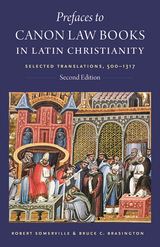
Prefaces to Canon Law Books in Latin Christianity
Selected Translations, 500-1317, second edition
Robert Somerville
Catholic University of America Press, 2021
An updated and expanded version of the original edition, published in 1998. That original edition went up through 1245. This new version extends to 1317 and adds two important prefaces.
Praise for the First Edition
“Both students and specialists can be grateful to the authors for this major contribution in English to the study of medieval canon law. It is a clear statement--one emphasized by the late John Gilchrist-that because of its critical importance in medieval life and culture canon law should not remain the obscure domain of specialists, but should be shared with students and non-specialists alike.” – The American Journal of Legal History
“[A] learned and useful book, which for the first time assembles a body of canonistic prefaces, presents them in an accessible form, and provides students of medieval canonical thought with a valuable new resource for study and teaching.” – The Catholic Historical Review
“This volume is an important and welcome addition to a field of studies where translations into English are few and far between. The breadth of the works selected, the quality of the translations, and the attention to detail that has long characterized the work of both editors make this a valuable resource for specialist and student alike.” – Church History
“A welcome combination: a text that is informative for students and professionals alike. The translations succeed in rendering accessible to a general audience some otherwise highly inaccessible material. Somerville and Brasington are to be greatly commended for undertaking this very original enterprise and bringing it to successful parturition.” – Journal of Law and Religion
“Somerville and Brasington have chosen to let their compilers and commentators speak for themselves. In doing so, they have had to wrestle with often obscure Latin and frequently less than satisfactory editions. That they succeed in making these texts intelligible through translation and annotation is no small feat.” – Sixteenth Century Journal
“This is a significant, elegantly presented contribution to the field of theology, cultural history, and canon law.” – Theological Studies
[more]
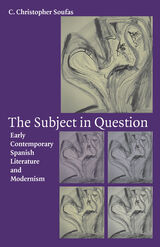
The Subject in Question
Early Contemporary Spanish Literature and Modernism
C. Christopher Soufas
Catholic University of America Press, 2007
The Subject in Question presents the first systematic study of "Spanish modernism" in an attempt to end Spain's literary isolation from the mainstream of early contemporary European literature.
[more]

Whose Sacrifice is the Eucharist? The Offering of Christ and His Church in Catholic and Methodist Theology
Stephen B. Sours
Catholic University of America Press, 2024
This book explores what Catholics and Methodists believe about eucharistic sacrifice. Eucharistic sacrifice refers to the offering that Christ and his church make in the celebration of the Lord’s Supper. It is, therefore, both a Christian doctrine and a church practice. The sacrificial dimension of the sacrament comes both from Christ’s sacrifice on the cross and from his self-offering at the Last Supper in which Christ gives himself to the Father on behalf of his people. “This is my body, which is given for you” (Luke 22:19). The eucharist is a sacrificial meal because in the bread and cup Christians are united to the body and blood of Christ that was sacrificed for them on the cross. Moreover, the resurrected Lord is really present with his people in the eucharist, and while his historic crucifixion is an event in the past, Jesus’ salvation continues and his grace is given to his people in the sacrament, “for this is my blood of the covenant, which is poured out for many for the forgiveness of sins” (Matthew 26:28). Catholics and Methodists believe that Jesus instructs his followers to repeat his words and actions from the Last Supper in their celebration of the eucharist, but a long running assumption is that Catholics and Methodists—following the historic Reformation schism—are deeply divided over eucharistic sacrifice. This book challenges that assumption by analyzing what these churches teach on eucharistic sacrifice from historical, sacramental, liturgical, and ecumenical perspectives. Key figures like Thomas Aquinas and John Wesley help define eucharistic sacrifice in each tradition. Subsequently, authoritative texts such as ecclesial statements, eucharistic prayers, and hymns further specify what Catholics and Methodists believe they are doing when they offer the eucharist to God. Sours argues that far from being divided, Catholics and Methodists have much in common regarding this controversial doctrine.
[more]
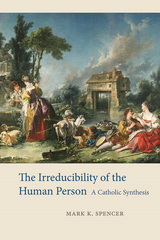
The Irreducibility of the Human Person
A Catholic Synthesis
Mark K. Spencer
Catholic University of America Press, 2022
Catholic philosophical anthropologists have defended views of the human person on which we are irreducible to anything non-personal. For example, it is not the case that we are nothing but matter, souls, or parts of society. But many Catholic anthropologies have overlooked ways in which we are irreducible and so have not given an adequate account of the uniqueness of each human person. This book presents a philosophical portrait of human persons that depicts each way in which we are irreducible, with the goal of guiding the reader to perceive, wonder at, and love all the unique features of human persons. It builds this portrait by showing how claims from many strands of the Catholic tradition can be synthesized. These strands include Thomism, Scotism, phenomenology, personalism, nouvelle théologie, analytic philosophy, and Greek and Russian thought. The book focuses on how these traditions’ claims are grounded in experience and on how they help us to perceive irreducible features of persons. While many metaphysical claims about persons are defended, the picture of persons that ultimately emerges is one on which persons are best grasped not through abstract concepts but through aesthetic perception and love, as unique kinds of beauty.
This book also explores irreducible features of our subjectivity, senses, intellect, freedom, and affections, and of our souls, bodies, and activities. It includes discussions of divine simplicity and causality, and of the nature of angels, matter, organisms, and artifacts, all of which must be understood to fully grasp our irreducibility. In showing how to synthesize various traditions’ claims, the book also offers new solutions to a number of debates in Catholic philosophy. These include debates over natural law, the natural desire to see God, the separated soul, integralism and personalism, idealist and realist phenomenology, and scholastic accounts of the act of existence.
[more]
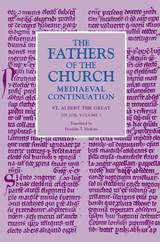
On Job, Volume 1
Franklin T. St. Albert The Great
Catholic University of America Press, 2019
Even prior to his death on 15 November 1280, the Dominican master Albert of Lauingen was legendary on account of his erudition. He was widely recognized for the depth and breadth of his learning in the philosophical disciplines as well as in the study of God, earning him the titles Doctor universalis and Doctor expertus. Moreover, his authoritative teaching merited him the moniker Magnus, an appellation bestowed on no other man of the High Middle Ages. This volume contains the first half of Albert the Great’s commentary On Job (on chs. 1-21), translated into English for the first time; a translation of the second half of the work will appear in a subsequent volume of the Fathers of the Church, Mediaeval Continuation series. Albert completed Super Iob in 1272 or 1274, when he was over seventy years old, at the Dominican Kloster of Heilige Kreuz in Cologne, where, as lector emeritus of the Order, he likely lectured on this profound biblical book. Significantly, Albert may have been inspired to produce On Job by his most famous student, Thomas Aquinas, who had written his own Joban commentary, the Expositio super Iob ad litteram, while serving as conventual lector at San Domenico in Orvieto from 1261 to 1264. Yet Albert occupies a unique position in the history of the interpretation of Job: he is the first and only exegete in history who explicitly reads the whole book as a debate in the mode of an academic or scholastic disputation among Job and his friends about divine providence concerning human affairs. The Introduction to this volume situates Albert’s On Job—its general approach and key exegetical features—in the broad context of Dominican theological education and pastoral formation in the thirteenth century.
[more]
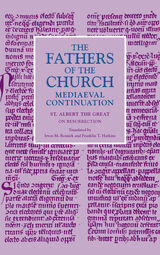
On Resurrection
Irven M. St. Albert the Great
Catholic University of America Press, 2020
According to 1 Cor 15.44 and 1 Cor 15.52, the human body “is sown an animal body, [but] it will rise a spiritual body” and “the dead will rise again incorruptible, and we will be changed.” These passages prompted many questions: What is a spiritual body? How can a body become incorruptible? Where will the resurrected body be located? And, what will be the nature of its experience? Medieval theologians sought to answer such questions but encountered troubling paradoxes stemming from the conviction that the resurrected body will be an “impassible body” or constituted from “incorruptible matter.” By the thirteenth century the resurrection demanded increased attention from Church authorities, not only in response to certain popular heresies but also to calm heated debates at the University of Paris. William of Auvergne, Bishop of Paris, officially condemned ten errors in 1241 and in 1244, including the proposition that the blessed in the resurrected body will not see the divine essence. In 1270 Parisian Bishop Étienne Tempier condemned the view that God cannot grant incorruption to a corruptible body, and in 1277 he rejected propositions that a resurrected body does not return as numerically one and the same, and that God cannot grant perpetual existence to a mutable, corruptible body.
The Dominican scholar Albert the Great was drawn into the university debates in Paris in the 1240s and responded in the text translated here for the first time. In it, Albert considers the properties of resurrected bodies in relation to Aristotelian physics, treats the condition of souls and bodies in heaven, discusses the location and punishments of hell, purgatory, and limbo, and proposes a “limbo of infants” for unbaptized children. Albert’s On Resurrection not only shaped the understanding of Thomas Aquinas but also that of many other major thinkers.
[more]
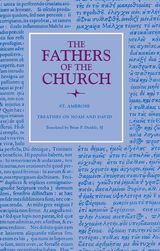
Treatises on Noah and David
Brian P. St. Ambrose
Catholic University of America Press, 2020
These sermons by Ambrose of Milan (340–397 AD) provide a window into the preaching and scriptural exegesis of the legendary bishop, whose exposition of the Old Testament was instrumental in the conversion of Augustine of Hippo and in the development of Latin theology. In his treatise On Noah and his two Defenses for David, Ambrose borrows from influential Greek theologians, including Philo of Alexandria, Origen, and Didymus the Blind, while developing his own commentary on the exemplary patriarchs. Ambrose’s exegesis typifies both his attention to the letter of Scripture as well as his spiritual and allegorical reading of the holy figures or “saints” who lived before Christ.
The first treatise presents Noah as a model just man, as Ambrose pairs the literal and the higher or spiritual meaning of the Genesis flood narrative to address topics ranging from the Genesis narrative to Stoic ethics to the Incarnation. In his defense of David to the emperor Theodosius, Ambrose ties David’s sin and repentance to his own close reading of Psalm 51(50), David’s plea for himself in his famous “Miserere.” While the authenticity of the third treatise included in the volume, the Second Apology of David, has long been challenged, recent scholarship suggests that it transmits Ambrose’s own preaching, which applies the lessons of David’s life to the situation of gentile unbelievers, Jews, and the church; even if it is the work of a later imitator, the Second Apology is a compelling and systematic treatment of the David’s sin and repentance as relevant to Christian morality and doctrine.
The three treatises, previously unavailable in English translation, broaden our understanding of exegesis in the Latin West and our interpretation of Ambrose as preacher and exegete.
The first treatise presents Noah as a model just man, as Ambrose pairs the literal and the higher or spiritual meaning of the Genesis flood narrative to address topics ranging from the Genesis narrative to Stoic ethics to the Incarnation. In his defense of David to the emperor Theodosius, Ambrose ties David’s sin and repentance to his own close reading of Psalm 51(50), David’s plea for himself in his famous “Miserere.” While the authenticity of the third treatise included in the volume, the Second Apology of David, has long been challenged, recent scholarship suggests that it transmits Ambrose’s own preaching, which applies the lessons of David’s life to the situation of gentile unbelievers, Jews, and the church; even if it is the work of a later imitator, the Second Apology is a compelling and systematic treatment of the David’s sin and repentance as relevant to Christian morality and doctrine.
The three treatises, previously unavailable in English translation, broaden our understanding of exegesis in the Latin West and our interpretation of Ambrose as preacher and exegete.
[more]
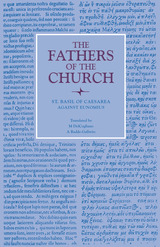
Against Eunomius
St. Basil of Caesarea
Catholic University of America Press, 2011
Basil of Caesarea is considered one of the architects of the Pro-Nicene Trinitarian doctrine adopted at the Council of Constantinople in 381, which eastern and western Christians to this day profess as ""orthodox."" Nowhere is his Trinitarian theology more clearly expressed than in his first major doctrinal work, Against Eunomius, finished in 364 or 365 CE. Responding to Eunomius, whose Apology gave renewed impetus to a tradition of starkly subordinationist Trinitarian theology that would survive for decades, Basil's Against Eunomius reflects the intense controversy raging at that time among Christians across the Mediterranean world over who God is. In this treatise, Basil attempts to articulate a theology both of God's unitary essence and of the distinctive features that characterize the Father, Son, and Holy Spirit--a distinction that some hail as the cornerstone of ""Cappadocian"" theology. In Against Eunomius, we see the clash not simply of two dogmatic positions on the doctrine of the Trinity, but of two fundamentally opposed theological methods. Basil's treatise is as much about how theology ought to be done and what human beings can and cannot know about God as it is about the exposition of Trinitarian doctrine. Thus Against Eunomius marks a turning point in the Trinitarian debates of the fourth century, for the first time addressing the methodological and epistemological differences that gave rise to theological differences. Amidst the polemical vitriol of Against Eunomius is a call to epistemological humility on the part of the theologian, a call to recognize the limitations of even the best theology. While Basil refined his theology through the course of his career, Against Eunomius remains a testament to his early theological development and a privileged window into the Trinitarian controversies of the mid-fourth century.
[more]
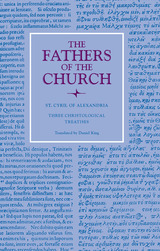
Three Christological Treatises
St. Cyril of Alexandria
Catholic University of America Press, 2014
Twenty-nine in all, these letters cover all but three of Cyril's years as a bishop. The first twelve were published in 2009 (Fathers of the Church 118). The present volume completes the set. Festal letters were used in Alexandria primarily to announce the beginning of Lent and the date of Easter. They also served a catechetical purpose, however, allowing the Patriarch an annual opportunity to write pastorally not just about issues facing the entire see, but also about the theological issues of the day. Thus, in these letters we catch a glimpse of Cyril the pastor writing about complex theology in an uncomplicated way. These letters also illuminate other realities of the ancient church in Alexandria, especially the relationship with the Jewish community and the rising influence of asceticism.
[more]
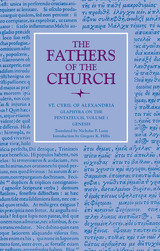
Glaphyra on the Pentateuch, Volume 1
Nicholas P. St. Cyril of Alexandria
Catholic University of America Press, 2019
Cyril of Alexandria (ca. 376–444) is best known for his defense of orthodoxy at the time of the Nestorian controversy over the nature of Christ. However, by far the larger part of Cyril’s literary output consisted of commentaries on books of both Old and New Testaments, written before the Christological debate was sparked off in 428. One of these works, of major proportions, was the so-called Glaphyra (“elegant comments”) on the Pentateuch. This comprises a total of thirteen separate “books,” or volumes: seven on Genesis, three on Exodus, and one each on Leviticus, Numbers and Deuteronomy. The comments primarily concern the narrative portions of the Pentateuch, hence the greater space given to Genesis, though a number of the legal prescriptions are also treated. This present volume, containing all seven books on Genesis, is the first of a projected two-volume set which will offer a translation of the whole Glaphyra for the first time in English. Cyril’s aims within the commentary are both theological and pastoral. His chosen method begins with a consideration of the historia. Here the Alexandrian patriarch deals with the text at the literal level. At this stage he explains any historical, cultural, and at times even linguistic and textual issues presented within the passage, which is then followed by some theological instruction or lessons of a more practical nature based upon the literal interpretation. The exposition then moves on to the theoria. This is Cyril’s preferred term for the contemplation of the spiritual sense, that is to say, the mystery of Christ which he firmly held lay hidden beneath the surface of the Old Testament text. With great adeptness and consistency Cyril identifies elements within the ancient narratives as figures, or “types and shadows,” of the Lord Jesus Christ, the Church, and the teachings of the gospel.
[more]
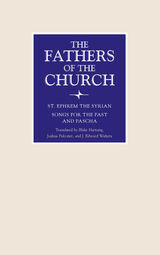
Songs for the Fast and Pascha
Blake St. Ephrem the Syrian
Catholic University of America Press, 2022
Among the writers of the Syriac Christian tradition, none is as renowned as St. Ephrem of Nisibis (ca. 307–373), known to much of the later Christian world simply as “the Syrian.” The great majority of Ephrem’s works are poetry, with the madrāšē (“teaching songs”) especially prominent.
This volume presents English translations of four complete madrāšē cycles of Ephrem: On the Fast, On the Unleavened Bread, On the Crucifixion, and On the Resurrection. These collections include some of the most liturgically oriented songs in Ephrem’s corpus, and, as such, provide a window into the celebration of Lent and Easter in the Syriac-speaking churches of northern Mesopotamia in the fourth century. Even more significantly, they represent some of the oldest surviving poetry composed for these liturgical seasons in the entire Christian tradition. Not only are the liturgical occasions of the springtime months a source of colorful imagery in these texts, but Ephrem also employs traditional motifs of warm weather, spring rainstorms, and revived vegetation, which likely reflect Hellenistic literary influences.
Like all of Ephrem’s poetry, these songs express early Christian theology in language that is symbolic, terse, and vibrant. They are rich with biblical allusions and references, especially to the Exodus and Passion narratives. They also reveal a contested religious environment in which Ephrem strove to promote the Christian Pascha and Christian interpretations of Scripture over and against those of Jewish communities in the region, thus maintaining firm boundaries around the identity and practices of the churches.
[more]
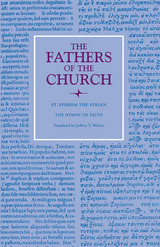
The Hymns on Faith
Jeffrey T. St. Ephrem the Syrian
Catholic University of America Press, 2015
Ephrem is known for a theology that relies heavily on symbol and for a keen awareness of Jewish exegetical traditions. Yet he is also our earliest source for the reception of Nicaea among Syriac-speaking Christians. It is in his eighty-seven Hymns on Faith - the longest extant piece of early Syriac literature - that he develops his arguments against subordinationist christologies most fully. These hymns, most likely delivered orally and compiled after the author's death, were composed in Nisibis and Edessa between the 350s ans 373. They reveal an author conversant with Christological debates further to the west, but responding in a uniquely Syriac idiom. As such, they form an essential source for reconstructing the development of pro-Nicene thought in the eastern Mediterranean.
[more]
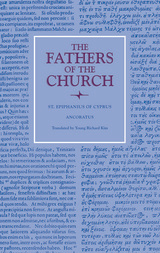
Ancoratus
St. Epiphanius of Cyprus
Catholic University of America Press, 2014
Epiphanius of Cyprus was lead bishop of the island from 367 until his death in 403, and he was a contemporary of several of the great church fathers of the patristic era, including Athanasius, Basil, and Jerome. He is well known among modern scholars for his monumental heresiology, the Panarion, as well as for his involvement in several ecclesiastical and theological controversies. Before he began to write his magnum opus, however, he had already completed the Ancoratus, an important theological treatise, written in the form of a letter to Christians in southern Anatolia. The Ancoratus addressed numerous theological issues, particularly in response to the continuous disputes about the divinity of the Son, the developing arguments over the divinity of the Holy Spirit, and the early quarrels over the Incarnation of Christ. In addition, he included his thoughts on proper biblical exegesis, the problematic theology of Origen, and the relationship of the Christian faith with Hellenistic culture. Epiphanius's convictions on these issues represented important contributions to the ongoing theological and cultural controversies of the late fourth century, but he has often been overshadowed in modern scholarship by the work of his more illustrious contemporaries. Because there has been no complete English translation of the Ancoratus to date, this volume adds significantly to the resources available for patristic studies.
[more]
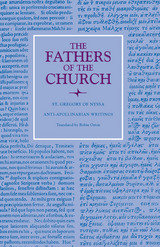
Anti-Apollinarian Writings
St. Gregory of Nyssa
Catholic University of America Press, 2016
The translation is interweaved with a commentary to provide the reader with some guidance through the complexities of Gregory's arguments. The introduction includes an overview of the history of Apollinarianism and discusses the extent to which it is possible to reconstruct, from the fragments quoted by Gregory, the arguments of Apolinarius's Apodeixis to which he is responding. It also examines the background to and the chronology of both of Gregory's anti-Apollinarian works, and looks critically at the arguments that they deploy.
[more]
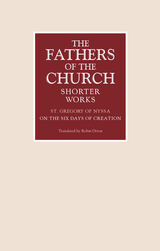
On the Six Days of Creation
Robin St. Gregory of Nyssa
Catholic University of America Press, 2021
The first volume of our new series, Fathers of the Church: Shorter Works, will be available in the summer of 2021. This series, to be printed only in paperback format, will offer English translations of treatises, homilies, poems, and letters of the Church Fathers in slim, easily affordable volumes. In this way a multitude of important writings will become accessible to scholars and students as well as the reading public.
This is the first complete English translation of St. Gregory of Nyssa’s treatise On the Six Days of Creation (In Hexaemeron). It was probably written in 380-381, and is designed as both a defense and a critique of his recently deceased brother St. Basil’s better known homilies on the creation story as set out in the first chapter of Genesis. At the same time it incorporates Gregory’s own observations on the Genesis text, which reflect his desire to show the consistency between Scripture and the philosophy and natural science of his day
A notable feature is Gregory’s presentation of God’s creation of the world as what has been called a “substantification” of God’s own will, creatio ex Deo rather than creatio ex nihilo. Other ideas of his seem interestingly to foreshadow those of modern science, notably his challenge to the idea that matter is a primary ontological category and his theory that the world as we know it developed through a process of “sequence” (akolouthia) from an originally simultaneous creation of everything.
Gregory differs from Basil in maintaining that the “waters above the firmament” in Genesis 1 are spiritual rather than physical in nature. He uses a modified form of Aristotle’s theory of elements, together with some interesting observations on geography and meteorology, to construct a detailed and ingenious account of the “water cycle.” This description enables him to refute Basil’s notion that there needs to be an extra supply of physical water above the firmament so that the water lost from earthly seas and rivers through evaporation can be “topped up.”
[more]
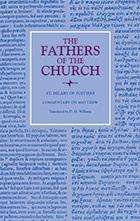
Commentary on Matthew
D.H. St. Hilary of Poiters
Catholic University of America Press, 2012
St. Jerome (347-420) has been considered the pre-eminent scriptural commentator among the Latin Church Fathers. His Commentary on Matthew, written in 398 and profoundly influential in the West, appears here for the first time in English translation.
[more]
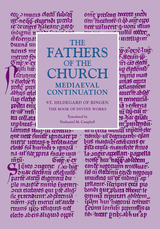
The Book of Divine Works
Nathaniel M. St. Hildegard of Bingen
Catholic University of America Press, 2018
Completed in 1173, The Book of Divine Works (Liber Divinorum Operum) is the culmination of the Visionary’s Doctor’s theological project, offered here for the first time in a complete and scholarly English translation. The first part explores the intricate physical and spiritual relationships between the cosmos and the human person, with the famous image of the universal Man standing astride the cosmic spheres. The second part examines the rewards for virtue and the punishments for vice, mapped onto a geography of purgatory, hellmouth, and the road to the heavenly city. At the end of each Hildegard writes extensive commentaries on the Prologue to John’s Gospel (Part 1) and the first chapter of Genesis (Part 2)—the only premodern woman to have done so. Finally, the third part tells the history of salvation, imagined as the City of God standing next to the mountain of God’s foreknowledge, with Divine Love reigning over all.
[more]

Exegetical Epistles, Volume 2
Thomas P. St. Jerome
Catholic University of America Press, 2024
This is the second of a two-volume set that includes Thomas Scheck’s new translations of several of St. Jerome’s previously untranslated exegetical letters. Epistle 85 to St. Paulinus of Nola contains Jerome’s answers to two questions: how Exodus 7.13 and Romans 9.16 can be reconciled with free will, and what 1 Corinthians 7.14 means. Epistle 106 to Sunnias and Fretela, which deals with textual criticism of the Septuagint, consists of a meticulous defense of Jerome’s new translation of the Latin Psalter. Epistle 112 is a response to three letters from St. Augustine: Ep. 56 (contained in the previous volume), Ep. 67, and Ep 104. In the face of Augustine’s criticisms, Jerome defends his own endeavor to translate the Old Testament directly from the
Hebrew text. He also vindicates his own ecclesiastical interpretation of Galatians 2.4-11, as he had set this forth in his Commentary on Galatians, and along the way he accuses Augustine of advocating the heresy of Judaizing. Epistle 119 to Minervius and Alexander contains Jerome’s answers to some eschatological questions regarding the interpretation of 1 Corinthians 15.51 and 1 Thessalonians 4.17. In Epistle 120 to Hedibia, Jerome tackles twelve exegetical questions that focus on reconciling the discrepant Resurrection accounts in the Gospels, as well as questions about Romans 9.14-29, 2 Corinthians 2.16, and 1 Thessalonians 5.23. In Epistle 121 to Algasia, Jerome clarifies eleven exegetical questions dealing with passages in the Gospels and Paul’s letters (Romans 5.7; 7.7-25; 9.3-5; Colossians 2.18-19; 2 Thessalonians 2.3). This letter also contains an exposition of the parable of the unjust steward (Luke 16.1-10), in which Jerome translates material from a commentary attributed to Theophilus of Antioch. In Epistle 129 to
Dardanus, Jerome interprets “the promised land” and discusses the alleged crimes of the Jews. Epistle 130 to Demetrias is not an exegetical letter but an exhortation to the newly consecrated virgin on how to live out her vocation. In this letter Jerome reflects on Origenism and Pelagianism. Finally, in Epistle 140 to Cyprian the presbyter, Jerome expounds Psalm 90.
[more]
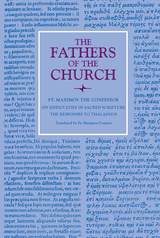
On Difficulties in Sacred Scripture
The Responses to Thalassios
Maximos St. Maximos the Confessor
Catholic University of America Press, 2018
Maximos the Confessor (ca. 580-662) is now widely recognized as one of the greatest theological thinkers, not simply in the entire canon of Greek patristic literature, but in the Christian tradition as a whole. A peripatetic monk and prolific writer, his penetrating theological vision found expression in an unparalleled synthesis of biblical exegesis, ascetic spirituality, patristic theology, and Greek philosophy, which is as remarkable for its conceptual sophistication as for its labyrinthine style of composition. On Difficulties in Sacred Scripture, presented here for the first time in a complete English translation (including the 465 scholia), contains Maximos’s virtuosic theological interpretations of sixty-five difficult passages from the Old and New Testaments. Because of its great length, along with its linguistic and conceptual difficulty, the work as a whole has been largely neglected. Yet alongside the Ambigua to John, On Difficulties in Sacred Scripture: The Responses to Thalassios deserves to be ranked as the Confessor’s greatest work and one of the most important patristic treatises on the interpretation of Scripture, combining the interconnected traditions of monastic devotion to the Bible, the biblical exegesis of Origen, the sophisticated symbolic theology of Dionysius the Areopagite, and the rich spiritual anthropology of Greek Christian asceticism inspired by the Cappadocian Fathers.
[more]
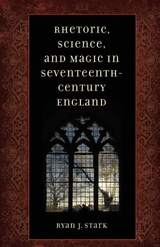
Rhetoric, Science, and Magic in Seventeenth-century England
Ryan J. Stark
Catholic University of America Press, 2009
Ryan J. Stark presents a spiritually sensitive, interdisciplinary, and original discussion of early modern English rhetoric. He shows specifically how experimental philosophers attempted to disenchant language
[more]

Words Made Flesh
The Sacramental Mission of Catholic Education
R. Jared Staudt
Catholic University of America Press, 2024
Forming souls and building culture together form the sacramental mission of Catholic education. These profoundly related goals are laid out by the Church for education, following the general sacramental principle that permeates the whole of Catholic life. This approach seeks conformity to the Logos, the divine mind, that shapes the way disciples think, imagine, and pray. Guided by this approach, the student will be able to contemplate the truth of reality in a holistic and integrated fashion. As sacramental, it also leads to a concrete embodiment in the life of the Christian community and the daily actions of the disciple. A sacramental approach to education draws together the inner and outer life: mind and body, soul and culture, prayer and work, salvation and mission, the individual and community. For the future of society and renewal within the Church, we need nothing less than a reintegration of the person and our communities through the renewal of education, forming students deeply rooted in our heritage and prepared to hand it on in creative ways.
[more]
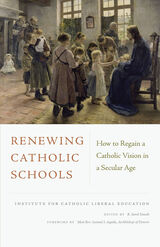
Renewing Catholic Schools
How to Regain a Catholic Vision for a Secular Age
R. Jared Staudt
Catholic University of America Press, 2020
Catholic education remains one of the most compelling expressions of the Church’s mission to form disciples. Despite decades of decline in the number of schools and students, many Catholic schools have been experiencing renewal by returning to the great legacy of the Catholic tradition. Renewing Catholic Schools offers an overview of the reasons behind this renewal and practical suggestions for administrators, clergy, teachers, and parents on how to begin the process of reinvigoration.
The book begins by situating Catholic education within the Church’s mission. Fidelity to Catholic mission and identity, including a commitment to the fulness of truth, provides the fundamental mark for the true success of Catholic education. The Catholic intellectual tradition, in particular, established by figures such as Augustine, Boethius, and Aquinas, can continue to direct Catholic schools, providing a depth of vision to overcome today’s educational crisis.
To transcend the now dominate secular model of education, Catholic schools can align their curriculum more closely to the Catholic tradition. One touchpoint comes from Archbishop Michael Miller’s The Holy See’s Teaching on Catholic Schools, which the book explores as a source for practical guidance. It also offers a Catholic vision for curriculum, examining the full range of subjects from gymnasium, the fine arts, the liberal arts, literature, history, and catechesis, all of which lead to a well-formed graduate, inspired by beauty, attune to truth, and ordered toward the good.
Finally, the book provides a practical vision for renewing the school through the formation of teachers, creation of a school community, and by offering suggestions for implementation of a stronger Catholic mission and philosophy of education. The teacher, ultimately, should strive to teach like Jesus, while the community should joyfully embody the school’s mission, making it a lived reality. The book concludes with examples of Catholic schools that have successfully undergone renewal.
[more]
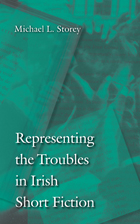
Representing the Troubles in Irish Short Fiction
Michael L. Storey
Catholic University of America Press, 2004
Representing the Troubles in Irish Short Fiction offers a comprehensive examination of Irish short stories written over the last eighty years that have treated the Troubles, Ireland's intractable conflict that arose out of its relationship to England.
[more]
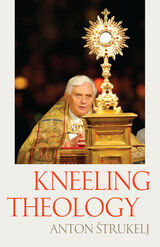
Kneeling Theology
Anton Strukelj
Catholic University of America Press, 2022
Anton Štrukelj, in this English edition of his book Kneeling Theology, which was published in German, Italian, Polish, Russian and Slovenian, based his theme on the concept first developed by Hans Urs von Balthasar. This Swiss intellectual is considered one of the most important theologians of the 20th century. Štrukelj sees as his task, through a synthetic survey of questions, to seek from his subjects a holistic perspective regarding the role of the theologian, without doing a critical analysis of all their work.
Kneeling Theology analyzes the process and its consequences that gave rise to the religious and cultural developments of the past and the present. It is his thesis that the essence of theology should flow from holiness. He relies for his evidence on the life and work of Hans Urs von Balthasar (which included the insights of Adrienne von Speyr, physician and mystic), Cardinal Joseph Ratzinger (Pope Benedict XVI), the Slovenian theologian Anton Strle (now servant of God) and Anton Vovk, former Archbishop of Ljubljana, fearless witness of Christ and his Church, also servant of God.
Štrukelj's purpose with this book is to point out that Catholic theology is best served, not only by competent research and a thorough knowledge of Church tradition, but by theologians who approach their work prayerfully and on their knees. The rich theological and pastoral heritage that has been bequeathed to us by a small group of special people in this book has come about because of their scholarship and their holiness. They have, each in their own way, demonstrated what it means to do theology on their knees, and they have shared their scholarship and insights with us.
[more]
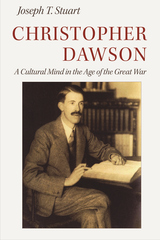
Christopher Dawson
A Cultural Mind in the Age of the Great War
Joseph T. Stuart
Catholic University of America Press, 2022
The English historian Christopher Dawson (1889-1970) was the first Catholic Studies professor at Harvard University and has been described as one of the foremost Catholic thinkers of modern times. His focus on culture prefigured its importance in Catholicism since Vatican Council II and in the rise of mainstream cultural history in the late twentieth century. How did Dawson think about culture and why does it matter? Joseph T. Stuart argues that through Dawson’s study of world cultures, he acquired a “cultural mind” by which he attempted to integrate knowledge according to four implicit rules: intellectual architecture, boundary thinking, intellectual asceticism, and intellectual bridges. Dawson’s multilayered approach to culture, instantiating John Henry Newman’s philosophical habit of mind, is key to his work and its relevance. By it, he responded to the cultural fragmentation he sensed after the Great War (1914-1918).
Stuart supports these claims by demonstrating how Dawson formed his cultural mind practicing an interdisciplinary science of culture involving anthropology, sociology, history, and comparative religion. Stuart shows how Dawson applied his cultural thinking to problems in politics and education.
This book establishes how Dawson’s simple definition of culture as a “common way of life” reconciles intellectualist and behavioral approaches to culture. In addition, Dawson’s cultural mind provides a synthesis helpful for recognizing the importance of Christian culture in education. It demonstrates principles which construct a more meaningful cultural history. Anyone interested in the idea of culture, the connection of religion to the social sciences, Catholic Studies, or Dawson studies will find this book an engaging and insightful intellectual history.
[more]
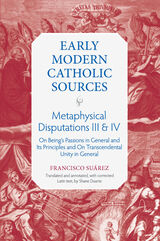
Metaphysical Disputations III and IV
On Being's Passions in General and Its Principles and On Transcendental Unity in General
Francisco Suarez
Catholic University of America Press, 2023
Francisco Suárez (1548-1617) was one of the most important philosophers and theologians of Early Modern Scholasticism. Although Suárez spent most of his academic career as a professor of theology, he is better known today for his Metaphysical Disputations (Salamanca, 1597). The present volume contains a facing-page English translation of Metaphysical Disputations III & IV. Metaphysical Disputation III offers a general treatment of the properties of being as such, while Metaphysical Disputation IV deals with one of these properties in particular, transcendental unity. The Latin text contained in this volume introduces a significant number of corrections to the text of the Vivès edition, the one standardly used by scholars of Suárez, and thus more faithfully reproduces the text of the first edition. The volume also contains a lengthy introduction that provides a detailed survey of the disputations’ principal claims and arguments.
[more]
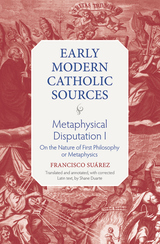
Metaphysical Disputation I
On the Nature of First Philosophy or Metaphysics
Francisco Suarez
Catholic University of America Press, 2021
Francisco Suárez (1548-1617) was one of the most important philosophers and theologians of Early Modern Scholasticism. Although Suárez spent most of his academic career as a professor of theology, he is better known today for his Metaphysical Disputations (Salamanca, 1597). The present volume contains a facing-page English translation of Metaphysical Disputation I, which is introductory and devoted to the nature of metaphysics itself. In it, Suárez first specifies this science’s object and nature (Sections 1 and 2) and then discusses its unity (Section 3), its end, utility and functions (Section 4), its status as the most perfect natural science and true wisdom (Section 5), and finally the thesis that it is the science most of all desired by means of a natural appetite (Section 6). Those interested in late scholastic conceptions of metaphysics and their influence on the better known metaphysical systems of the seventeenth century – e.g., Descartes’s – will find the volume especially useful. The Latin text contained in this volume introduces a significant number of corrections to the text of the Vivès edition, the one standardly used by scholars of Suárez, and thus more faithfully reproduces the text of the first edition. The volume also contains a lengthy introduction that provides a detailed survey of the disputation’s principal claims and arguments.
[more]
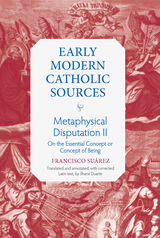
Metaphysical Disputation II
On the Essential Concept or Concept of Being
Francisco Suarez
Catholic University of America Press, 2022
Francisco Suárez (1548-1617) was one of the most important philosophers and theologians of early modern Aristotelian scholasticism. Although Suárez spent most of his academic career as a professor of theology, he is better known today for his Metaphysical Disputations (Salamanca, 1597). The present volume contains a facing-page English translation of Metaphysical Disputation II, which is devoted to the nature of real being, the subject of metaphysics. In it, Suárez is especially concerned, first, to argue there is a single nature of being common to all real beings, and second, to show what this nature consists in. The Latin text contained in this volume introduces a significant number of corrections to the text of the Vivès edition, the one standardly used by scholars of Suárez, and thus more faithfully reproduces the text of the first edition. The volume also contains a lengthy introduction that provides a detailed survey of the disputation’s principal claims and arguments.
[more]
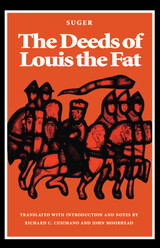
The Deeds of Louis the Fat
Abbot of Saint Denis, Suger
Catholic University of America Press, 1992
No description available
[more]
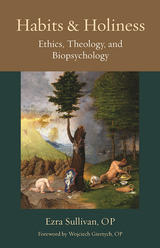
Habits and Holiness
Ethics, Theology, and Biopsychology
Ezra, OP Sullivan
Catholic University of America Press, 2021
The topic of habitus is one of Thomas Aquinas’s greatest contributions to moral theology, but it has been generally neglected in theological scholarship until now. Habits and Holiness is the first work in English to explore Aquinas’s rich theology of habit in all of its grandeur and depth. Habits and Holiness shows that most facets of human life and behavior are greatly influenced by habits, which Thomas appraises as an analogous concept that is much broader than previous scholarship has recognized.
Habits and Holiness accomplishes three tasks. First, it gives a complete and coherent account of Aquinas’s account of habitus. Most accounts of Aquinas’s view of habitus focus almost exclusively on “Treatise on Habits” in the Summa Theologiae I-II, qq. 49-54, and speak of habitus in reference to the virtues. However, Aquinas speaks of habitus in many other places, especially his commentaries on Aristotle’s works and his commentaries on Sacred Scripture. Aquinas employs the concept of habitus to explain a wide variety of human inclinations, such as instincts, personal and societal custom, acquired skills and virtues, original sin, grace, infused virtues, and Gifts of the Holy Spirit. Second, this book indicates how biological psychology illuminates and enriches Aquinas’s account of habit, and vice versa. Finally, Habits and Holiness provides readers with a framework for interpreting and utilizing the vast amount of practical habit literature that exists: it offers a practical analysis of habit development found in Aquinas’s works and those of empirical studies.
The topic of habits is a golden thread that helps readers find their way through Aquinas’s extensive writings on morals. By describing the many kinds of habits we possess, and their widespread but often hidden effects in our lives, this book offers a new and unique reevaluation of many issues central to the moral life. It addresses childhood development, pagan virtue, akrasia, circumstances that limit free choice, how heroic virtue operates, and more.
By seeing habits in general as a prism for understanding human action and its influences, Habits and Holiness provides a unique and appealing synthesis of Thomistic virtue theory, the contemporary science of habits, and best practices for eliminating bad habits and living good habits.
[more]
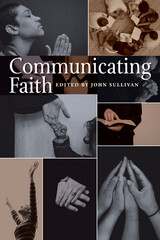
Communicating Faith
John Sullivan
Catholic University of America Press, 2011
This book enriches appreciation of the many ways that Christian faith is communicated. It casts light on the sensitivities, skills, and qualities necessary for the effective communication of faith, where justice is done both to the "seed" to be sown and to the "soil" being cultivated.
[more]
READERS
Browse our collection.
PUBLISHERS
See BiblioVault's publisher services.
STUDENT SERVICES
Files for college accessibility offices.
UChicago Accessibility Resources
home | accessibility | search | about | contact us
BiblioVault ® 2001 - 2024
The University of Chicago Press









